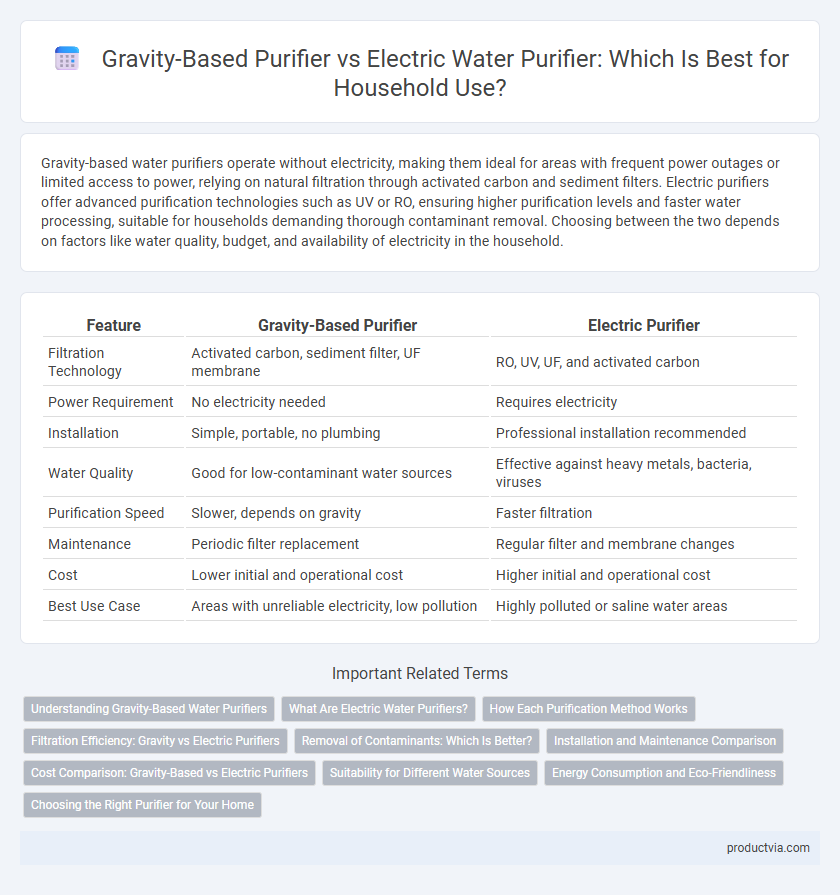Gravity-based water purifiers operate without electricity, making them ideal for areas with frequent power outages or limited access to power, relying on natural filtration through activated carbon and sediment filters. Electric purifiers offer advanced purification technologies such as UV or RO, ensuring higher purification levels and faster water processing, suitable for households demanding thorough contaminant removal. Choosing between the two depends on factors like water quality, budget, and availability of electricity in the household.
Table of Comparison
| Feature | Gravity-Based Purifier | Electric Purifier |
|---|---|---|
| Filtration Technology | Activated carbon, sediment filter, UF membrane | RO, UV, UF, and activated carbon |
| Power Requirement | No electricity needed | Requires electricity |
| Installation | Simple, portable, no plumbing | Professional installation recommended |
| Water Quality | Good for low-contaminant water sources | Effective against heavy metals, bacteria, viruses |
| Purification Speed | Slower, depends on gravity | Faster filtration |
| Maintenance | Periodic filter replacement | Regular filter and membrane changes |
| Cost | Lower initial and operational cost | Higher initial and operational cost |
| Best Use Case | Areas with unreliable electricity, low pollution | Highly polluted or saline water areas |
Understanding Gravity-Based Water Purifiers
Gravity-based water purifiers rely on natural gravitational force to filter water through layers of activated carbon, sediment, and sometimes UV or RO membranes without the need for electricity. These purifiers are ideal for areas with inconsistent power supply and emphasize ease of maintenance, portability, and energy efficiency. Their filtration efficacy ensures removal of bacteria, sediments, and chlorine, providing safe drinking water for households with minimal operational costs.
What Are Electric Water Purifiers?
Electric water purifiers use advanced technology such as UV, RO, or UF filtration to remove bacteria, viruses, and harmful contaminants from household water. These purifiers require an electrical power source and often feature faster purification rates compared to gravity-based models. Many electric purifiers come equipped with digital indicators and automatic shut-off features for enhanced safety and convenience.
How Each Purification Method Works
Gravity-based water purifiers use a filtration process where water passes through activated carbon, sediment filters, and often UF membranes by the force of gravity, effectively removing impurities and sediments without electricity. In contrast, electric water purifiers utilize powered technologies like RO (Reverse Osmosis), UV (Ultraviolet), or UF (Ultrafiltration) combined with pumps and electronic sensors to eliminate contaminants, bacteria, and viruses more rapidly. Each method targets household water purification by leveraging distinct mechanisms: gravity-based systems rely on passive filtration, while electric purifiers enhance purification through active, energy-driven processes.
Filtration Efficiency: Gravity vs Electric Purifiers
Gravity-based water purifiers utilize activated carbon and sediment filters that effectively remove large particles and chlorine, but their filtration efficiency is limited against pathogens and dissolved contaminants. Electric purifiers, often equipped with UV or RO technology, provide superior filtration by eliminating bacteria, viruses, heavy metals, and other microscopic impurities. For households prioritizing comprehensive water purification, electric purifiers offer higher filtration efficiency and safer drinking water compared to gravity-based systems.
Removal of Contaminants: Which Is Better?
Gravity-based water purifiers rely on filtration through activated carbon and ceramic filters, effectively removing sediments, chlorine, and some bacteria but may struggle with heavy metals and viruses. Electric water purifiers use advanced technologies such as UV, RO, and UF, offering superior removal of a wider range of contaminants including dissolved salts, heavy metals like lead and arsenic, and viruses. For households requiring comprehensive purification, especially in areas with high TDS (Total Dissolved Solids) or microbial contamination, electric purifiers typically provide better contaminant removal performance.
Installation and Maintenance Comparison
Gravity-based water purifiers require no electrical connection, enabling easy installation in any household without professional assistance, while electric purifiers often demand skilled setup and stable power supply. Maintenance of gravity-based systems involves simple periodic cleaning and filter replacement, whereas electric purifiers need regular servicing of electrical components along with filter changes to ensure optimal performance. Choosing between them depends on prioritizing hassle-free installation and low-maintenance needs versus advanced purification features that typically come with electric units.
Cost Comparison: Gravity-Based vs Electric Purifiers
Gravity-based water purifiers generally have a lower upfront cost and minimal maintenance expenses, making them an affordable choice for households with limited budgets. Electric water purifiers involve higher initial investment and ongoing electricity costs, but often offer faster purification and additional features like UV or RO technology. When comparing overall cost-effectiveness, gravity-based purifiers excel in energy savings while electric purifiers may provide better water quality and convenience despite higher operating expenses.
Suitability for Different Water Sources
Gravity-based water purifiers excel in filtering untreated water sources such as borewell or river water by relying on natural sedimentation and activated carbon filters, making them ideal for areas with irregular electricity supply. Electric purifiers provide advanced multi-stage purification including UV or RO technology, suitable for municipal tap water and heavily contaminated sources requiring removal of dissolved salts and pathogens. Choosing the right purifier depends on the water source's turbidity, contamination level, and availability of electricity in the household.
Energy Consumption and Eco-Friendliness
Gravity-based water purifiers operate without electricity, relying solely on gravitational force to filter water, making them highly energy-efficient and eco-friendly options for households. Electric water purifiers consume power continuously, leading to higher energy usage and a larger environmental footprint due to electricity generation and associated emissions. Choosing a gravity-based purifier reduces household energy consumption and carbon emissions, supporting sustainable living practices.
Choosing the Right Purifier for Your Home
Gravity-based water purifiers utilize natural filtration processes and do not require electricity, making them ideal for areas with frequent power outages or low electricity availability. Electric water purifiers offer advanced purification technologies such as UV and RO, ensuring removal of contaminants like bacteria, viruses, and heavy metals, suitable for urban households with unreliable tap water quality. Choosing the right purifier depends on your home's water source, electricity reliability, and specific contaminant concerns to ensure safe and clean drinking water consistently.
Gravity-Based Purifier vs Electric Purifier for Household Use Infographic

 productvia.com
productvia.com